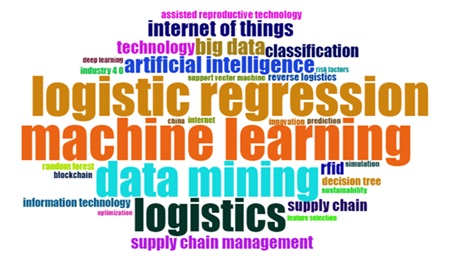Research trends on technologies in logistics management
DOI:
https://doi.org/10.51252/rcsi.v4i2.755Keywords:
machine learning, data mining, big data, internet of things, supply chainAbstract
This article analyzes research trends on the use of technologies in logistics management, a key area for operational efficiency in organizations and supply chains. The main objective was to identify the most relevant technological advancements, the sources with the highest scientific production, and the international collaborations driving research in this field. A bibliometric approach was employed, based on 11,522 scientific articles extracted from the Scopus database between 2010 and 2020, using a search string focused on logistics and emerging technologies such as Artificial Intelligence, Big Data, and the Internet of Things. The documents were analyzed using the Biblioshiny tool to identify trends and patterns. The results reveal a steady increase in scientific production, particularly since 2016, with journals such as PLOS ONE and Sustainability (Switzerland) standing out as the main sources of publications. The University of California leads institutional production, followed by Huazhong University of Science and Technology. Moreover, frequent terms like "machine learning" and "data mining" reflect a focus on data analysis techniques and artificial intelligence in logistics. The study concludes that logistics management is being transformed by technological innovations and that this research area will continue to grow, driven by international collaboration and the application of emerging technologies to optimize the efficiency and sustainability of logistics processes.
Downloads
References
Ahmad, M., Ahmed, I., & Jeon, G. (2022). A sustainable advanced artificial intelligence-based framework for analysis of COVID-19 spread. Environment, Development and Sustainability. https://doi.org/10.1007/s10668-022-02584-0
Aria, M., & Cuccurullo, C. (2017). bibliometrix : An R-tool for comprehensive science mapping analysis. Journal of Informetrics, 11(4), 959-975. https://doi.org/10.1016/j.joi.2017.08.007
Awashreh, R., Hamid, A., Mohamed, B. E., & Farsi, H. Al. (2024). The impact of logistics management on logistics service performance: A study on maritime transportation services in Oman. Uncertain Supply Chain Management, 12(4), 2113-2122. https://doi.org/10.5267/j.uscm.2024.7.004
Barrantes-Olarte, F. (2023). Propuesta de mejora en la infraestructura logística del puesto de control fronterizo aduanero de Iñapari-Madre de Dios y sus efectos en el comercio exterior 2013-2017. Revista Amazónica de Ciencias Económicas, 2(2), e622. https://doi.org/10.51252/race.v2i2.622
Benzidia, S., Makaoui, N., & Bentahar, O. (2021). The impact of big data analytics and artificial intelligence on green supply chain process integration and hospital environmental performance. Technological Forecasting and Social Change, 165, 120557. https://doi.org/10.1016/j.techfore.2020.120557
Esper, T. L., Castillo, V. E., Ren, K., Sodero, A., Wan, X., Croxton, K. L., Knemeyer, A. M., DeNunzio, S., Zinn, W., & Goldsby, T. J. (2020). Everything Old is New Again: The Age of Consumer‐Centric Supply Chain Management. Journal of Business Logistics, 41(4), 286-293. https://doi.org/10.1111/jbl.12267
Goldsby, T. J., & Zinn, W. (2016). Technology Innovation and New Business Models: Can Logistics and Supply Chain Research Accelerate the Evolution? Journal of Business Logistics, 37(2), 80-81. https://doi.org/10.1111/jbl.12130
Gutiérrez-Ortiz, A., Méndez-González, C., & Infante-Jiménez, Z. T. (2023). Desempeño logístico, infraestructura portuaria y conectividad marítima en el Continente Americano: un modelo panel dinámico. Revista Amazónica de Ciencias Económicas, 2(2), e526. https://doi.org/10.51252/race.v2i2.526
Liu, C., Lyu, J., & Fang, K. (2024). Integrated packing and routing: A model and its solutions. Computers & Operations Research, 172, 106790. https://doi.org/10.1016/j.cor.2024.106790
McBurney, M. K., & Novak, P. L. (2002). What is bibliometrics and why should you care? Proceedings. IEEE International Professional Communication Conference, 108-114. https://doi.org/10.1109/IPCC.2002.1049094
Mishra, D., & Mitra, R. (2024). Heterogeneous truck fleet optimization. Sādhanā, 49(3), 237. https://doi.org/10.1007/s12046-024-02578-w
Mittal, A., Chaturvedi, D. D., Chaturvedi, S., & Singh, P. K. (2024). Impact of Negative Aspects of Artificial Intelligence on Customer Purchase Intention (pp. 159-173). https://doi.org/10.4018/979-8-3693-0724-3.ch010
Mustafa, M. F. M. S., Navaranjan, N., & Demirovic, A. (2024). Food cold chain logistics and management: A review of current development and emerging trends. Journal of Agriculture and Food Research, 18, 101343. https://doi.org/10.1016/j.jafr.2024.101343
Pech, M., Vrchota, J., & Bednář, J. (2021). Predictive Maintenance and Intelligent Sensors in Smart Factory: Review. Sensors, 21(4), 1470. https://doi.org/10.3390/s21041470
Pessot, E., Zangiacomi, A., Marchiori, I., & Fornasiero, R. (2023). Empowering supply chains with Industry 4.0 technologies to face megatrends. Journal of Business Logistics, 44(4), 609-640. https://doi.org/10.1111/jbl.12360
Ramasamy, I., Natarajan, S., & Sathyamoorthy, V. K. P. (2024). Does disruptive technology and AI (Artificial Intelligence) influence logistics management? Multidisciplinary Science Journal, 6(12), 2024259. https://doi.org/10.31893/multiscience.2024259
Vernier, C., Loeillet, D., Thomopoulos, R., & Macombe, C. (2021). Adoption of ICTs in Agri-Food Logistics: Potential and Limitations for Supply Chain Sustainability. Sustainability, 13(12), 6702. https://doi.org/10.3390/su13126702
Watson, G. J., Desouza, K. C., Ribiere, V. M., & Lindič, J. (2021). Will AI ever sit at the C-suite table? The future of senior leadership. Business Horizons, 64(4), 465-474. https://doi.org/10.1016/j.bushor.2021.02.011
Zamani, E. D., Smyth, C., Gupta, S., & Dennehy, D. (2023). Artificial intelligence and big data analytics for supply chain resilience: a systematic literature review. Annals of Operations Research, 327(2), 605-632. https://doi.org/10.1007/s10479-022-04983-y

Published
How to Cite
Issue
Section
License
Copyright (c) 2024 Jesús Isaías Hanco-Mamani

This work is licensed under a Creative Commons Attribution 4.0 International License.
The authors retain their rights:
a. The authors retain their trademark and patent rights, as well as any process or procedure described in the article.
b. The authors retain the right to share, copy, distribute, execute and publicly communicate the article published in the Revista Científica de Sistemas e Informática (RCSI) (for example, place it in an institutional repository or publish it in a book), with an acknowledgment of its initial publication in the RCSI.
c. Authors retain the right to make a subsequent publication of their work, to use the article or any part of it (for example: a compilation of their works, notes for conferences, thesis, or for a book), provided that they indicate the source of publication (authors of the work, journal, volume, number and date).








